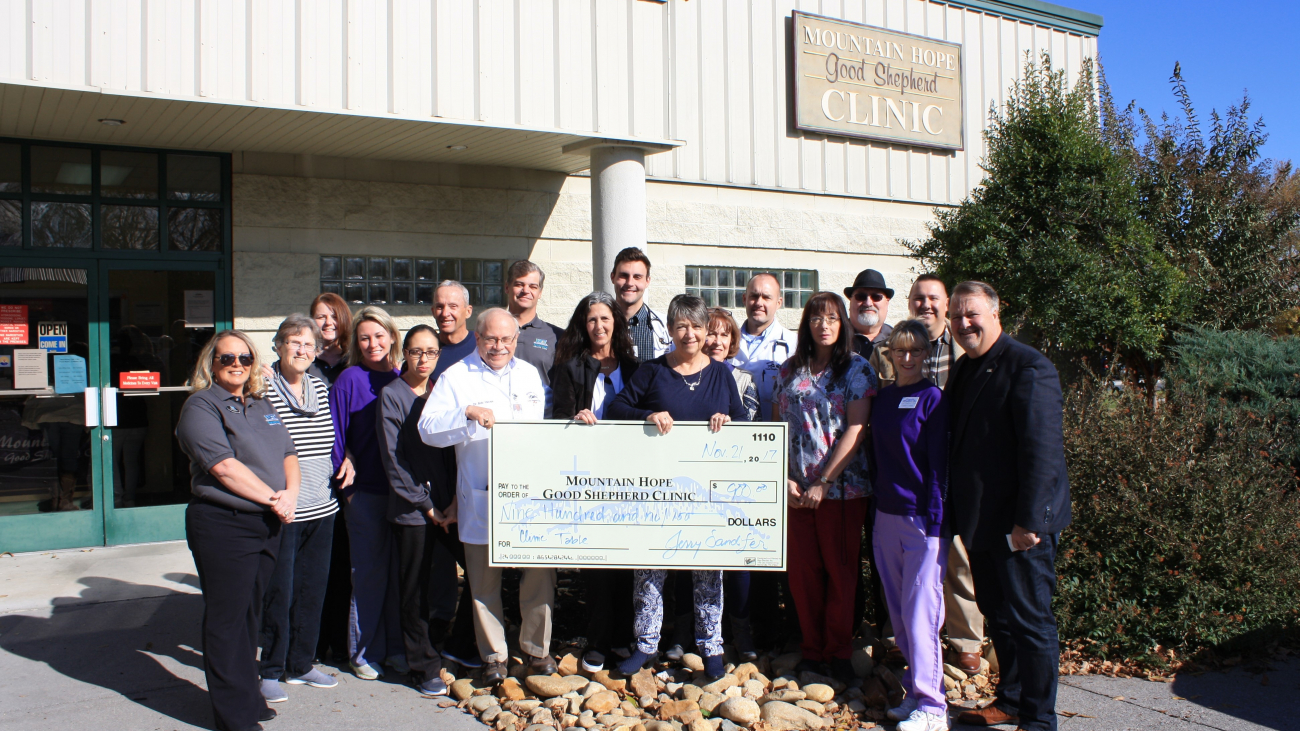November 21, 2017
Dear Friends,
The first time I sat down to write this letter about a week ago, my heart wasn’t in it. An old friend and co-worker had been on my mind. I lost Allen to Hepatitis C almost 15 years ago and his death has weighed heavily on me since. I was pregnant and because of his illness, I had not been allowed even to say goodbye. It’s one of a few reasons I hadn’t been much in the mood to write this letter.
I think we all get a little jaded sometimes. After last year’s fires, the community has mostly settled back into its old patterns. Buildings have been rebuilt, children are back in school, the number of folks who need breathing meds has lessened, and I am back in my office, armed with coffee and a pen, ready to write another letter to you all, a year later. It is what I do, but I am tired of thinking that there are so many ways we are still fighting fires.
It’s Monday when I get the call, “Ian Hanson is here to see you,” a patient of Jason Brackins, our physician’s assistant, and someone Jason thinks I should meet. Ian soon stands at my door, and there is nothing remarkable about him. Noticing he looks nervous, I assure him I just want to talk.
Ian speaks softly as he tells me his mother remarried when he was 8. Ian’s stepfather often crossed the line of verbal abuse, and he endured until graduation day. “They threw me a graduation party,” he tells me. “I left their home the minute it was over.” Ian’s mother, Linda, divorced his stepfather shortly thereafter, and Ian, now a father himself, moved back in with her to help pay expenses.
After being laid off from a second job, Ian enlisted in the Army, but soon received a medical discharge due to issues with his ankles. Ian, having failed at a relationship with his daughter’s mother, and having few options for work, became depressed. Eventually, Linda moved back in with his stepfather.
At this point, the story takes a much darker turn, as Ian relays to me finding his stepfather’s body outside the house, the result of suicide. “Things got really bad then,” he says, pained. Indeed, his next few months were riddled with bad decisions and anxiety and drug abuse—the final leg in Ian’s journey to rock bottom. He describes the squalor he saw around him during those months, the numbness, the sharing of needles… and then, “I couldn’t let my kid see me like that,” he shivers as he sits in the chair before me. “I had to get out.”
When Linda told Ian that she planned to move to Tennessee, he jumped at the chance to make a change. He’s been clean a year.
Ian first came to the Clinic with a cold. His new job didn’t afford him health coverage. Jason noticed something awry in Ian’s basic blood panel, and soon discovered Ian was Hepatitis C-positive. “That’s a big blow when you’re finally getting your world together.” Indeed. A quick lesson: Hep C is a chronic viral infection of the liver and is transmitted by body fluids. Those diagnosed often die an excruciating death as their livers are destroyed. Blood donors weren’t checked for Hep C before 1992, so a lot of people are spreading it who simply don’t know they have it. “I got it from making bad decisions,” Ian tells me, but not everyone gets it that way. Most Baby Boomers don’t consider getting screened. Hep C is multiplying exponentially. It is one of the many fires we’re still fighting at Mountain Hope, and it won’t be the last.
I have always cringed at the words “Hep C” as it continues to make people horribly sick, but I also know that now, people who can afford it can beat Hep C thanks to Gilead, a drug company that makes the medicine Harvoni. The harsh reality is that the 12-week course of medication that leads to a 97% cure rate costs about $92,000. Would Allen and his family have been able to come up with that money if he’d gotten sick later? I have wondered about that a lot lately. My guess is they wouldn’t… and I knew too well that Ian would have no shot at coming up with those funds either.
Yet, on August 7, Jason put Ian on the drug that will cure him. Robin Young, our patient assistance rep, had begun working with Gilead to get the drug donated at no cost. “$92,000,” Ian lowers his eyes and tells me, “God bless Gilead.” I’m a little emotional. In an effort to lighten the mood, I ask Ian what he loves about Sevier County. “I can be healthy here,” he smiles. “The air is good. The views are amazing. This place is changing me.”
Jason tells me that we have about a dozen patients on this medication, all with unique stories; I would give just about anything to be able to tell Allen we are saving people from the horrible death he endured. All of them are going to be cured because of our partnership with Gilead; we’re putting a dent in stopping the spread of this disease here in Sevier County. It is one of a thousand reasons it is so important to keep our doors open.
So again, I’m asking for help. You know that folks depend on us when they sprain an ankle or get the flu, and can’t afford a doctor otherwise, but it’s bigger than that because we’re all vested in this community. We can’t afford to let a disease like Hep C run rampant here—and Hep C is just one threat. What we do here means we’re all better off…Fifteen years from now, no friend of one of those dozen patients will wonder What if…?
This year, my own donation will be in honor of the memory of the beloved friend I lost too soon. Perhaps you can also honor someone you love as you make a life-saving gift. Please, as Christmas approaches, remember that health can’t be taken for granted. Our patients and this community need you. If you can do nothing more, I ask you to pray for us in Sevier County. If you can help us with the costs of providing medical care, emergency dental care, and prescription drugs for our neighbors, I want you to know you’re making a difference that is beyond measure– for people like Ian and more than 23,000 others. You are part of the tradition of generosity and grace and hope that has always made Sevier County the best place in the world to ……call home, a place that changes people for the better, and you are the reason we will rally and overcome diseases and other obstacles like Hep C. I think I said it last year when we were fighting the effects of literal fires: We are in this together, and we will survive and thrive.
May you be blessed for your faithfulness,
Ashley Burnette, Director of Fund Development
Mary Vance, Executive Director
Mountain Hope Good Shepherd Clinic
*names in this letter have been changed to assure privacy
https://mountainhope.wpengine.com/donate/





